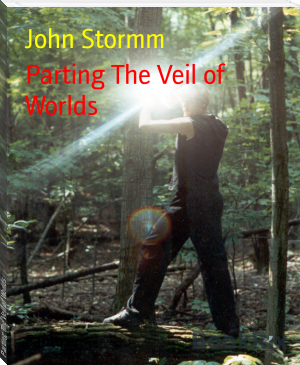The Well at the World's End: A Tale, William Morris [rainbow fish read aloud TXT] 📗

- Author: William Morris
Book online «The Well at the World's End: A Tale, William Morris [rainbow fish read aloud TXT] 📗». Author William Morris
Ralph looked no brighter for this word, and he answered nought to it: but said presently:
"And what is to be looked for beyond Higham if one goeth further? Dost thou know the land any further?"
The carle smiled: "Yea forsooth, and down to the Wood Perilous, and beyond it, and the lands beyond the Wood; and far away through them. I say not that I have been to the Dry Tree; but I have spoken to one who hath heard of him who hath seen it; though he might not come by a draught of the Well at the World's End."
Ralph's eyes flashed, and his cheeks reddened as he listened hereto; but he spake quietly:
"Master Clement, how far dost thou make it to Higham-on-the-Way?"
"A matter of forty miles," said the Chapman; "because, as thou wottest, if ye ride south from hence, ye shall presently bring your nose up against the big downs, and must needs climb them at once; and when ye are at the top of Bear Hill, and look south away ye shall see nought but downs on downs with never a road to call a road, and never a castle, or church, or homestead: nought but some shepherd's hut; or at the most the little house of a holy man with a little chapel thereby in some swelly of the chalk, where the water hath trickled into a pool; for otherwise the place is waterless." Therewith he took a long pull at the tankard by his side, and went on:
"Higham is beyond all that, and out into the fertile plain; and a little river hight Coldlake windeth about the meadows there; and it is a fair land; though look you the wool of the downs is good, good, good! I have foison of this year's fleeces with me. Ye shall raise none such in Upmeads."
Ralph sat silent a little, as if pondering, and then he started up and said: "Good master Clement, we have eaten thy meat and thank thee for that and other matters. Wilt thou now be kinder, and bid thy boy bring round Falcon our horse; for we have far to go, and must begone straight-away."
"Yea, lord," said Clement, "even so will I do." And he muttered under his breath; "Thou talkest big, my lad, with thy 'we'; but thou art pressed lest Nicholas be here presently to fetch thee back; and to say sooth I would his hand were on thy shoulder even now."
Then he spake aloud again, and said:
"I must now begone to my lads, and I will send one round with thy war-horse. But take my rede, my lord, and become the man of the Abbot of St. Mary's of Higham, and all will be well."
Therewith he edged himself out of the chamber, and the dame fell to making a mighty clatter with the vessel and trenchers and cups on the board, while Ralph walked up and down the chamber his war-gear jingling upon him. Presently the dame left her table-clatter and came up to Ralph and looked kindly into his face and said: "Gossip, hast thou perchance any money?"
He flushed up red, and then his face fell; yet he spake gaily: "Yea, gossip, I have both white and red: there are three golden crowns in my pouch, and a little flock of silver pennies: forsooth I say not as many as would reach from here to Upmeads, if they were laid one after the other."
She smiled and patted his cheek, and said:
"Thou art no very prudent child, king's son. But it comes into my mind that my master did not mean thee to go away empty-handed; else had he not departed and left us twain together."
Therewith she went to the credence that stood in a corner, and opened a drawer therein and took out a little bag, and gave it into Ralph's hand, and said: "This is the gift of the gossip; and thou mayst take it without shame; all the more because if thy father had been a worser man, and a harder lord he would have had more to give thee. But now thou hast as much or more as any one of thy brethren."
He took the bag smiling and shame-faced, but she looked on him fondly and said:
"Now I know not whether I shall lay old Nicholas on thine heels when he cometh after thee, as come he will full surely; or whether I shall suffer the old sleuth-hound nose out thy slot of himself, as full surely he will set on to it."
"Thou mightest tell him," said Ralph, "that I am gone to take service with the Abbot of St. Mary's of Higham: hah?"
She laughed and said: "Wilt thou do so, lord, and follow the rede of that goodman of mine, who thinketh himself as wise as Solomon?"
Ralph smiled and answered her nothing.
"Well," she said, "I shall say what likes me when the hour is at hand. Lo, here! thine horse. Abide yet a moment of time, and then go whither thou needs must, like the wind of the summer day."
Therewith she went out of the chamber and came back again with a scrip which she gave to Ralph and said: "Herein is a flask of drink for the waterless country, and a little meat for the way. Fare thee well, gossip! Little did I look for it when I rose up this morning and nothing irked me save the dulness of our town, and the littleness of men's doings therein, that I should have to cut off a piece of my life from me this morning, and say, farewell gossip, as now again I do."
Therewith she kissed him on either cheek and embraced him; and it might be said of her and him that she let him go thereafter; for though as aforesaid he loved her, and praised her kindness, he scarce understood the eagerness of her love for him; whereas moreover she saw him not so often betwixt Upmeads and Wulstead: and belike she herself scarce understood it. Albeit she was a childless woman.
So when he had got to horse, she watched him riding a moment, and saw how he waved his hand to her as he turned the corner of the market-place, and how a knot of lads and lasses stood staring on him after she lost sight of him. Then she turned her back into the chamber and laid her head on the table and wept. Then came in the goodman quietly and stood by her and she heeded him not. He stood grinning curiously on her awhile, and then laid his hand on her shoulder, and said as she raised her face to him:
"Sweetheart, it availeth nought; when thou wert young and exceeding fair, he was but a little babe, and thou wert looking in those days to have babes of thine own; and then it was too soon: and now that he is such a beauteous young man, and a king's son withal, and thou art wedded to a careful carle of no weak heart, and thou thyself art more than two-score years old, it is too late. Yet thou didst well to give our lord the money. Lo! here is wherewithal to fill up the lack in thy chest; and here is a toy for thee in place of the pair of beads thou gavest him; and I bid thee look on it as if I had given him my share of the money and the beads."
She turned to Clement, and took the bag of money, and the chaplet which he held out to her, and she said: "God wot thou art no ill man, my husband, but would God I had a son like to him!"
She still wept somewhat; but the chapman said: "Let it rest there, sweetheart! let it rest there! It may be a year or twain before thou seest him again: and then belike he shall be come back with some woman whom he loves better than any other; and who knows but in a way he may deem himself our son. Meanwhile thou hast done well, sweetheart, so be glad."
Therewith he kissed her and went his ways to his merchandize, and she to the ordering of her house, grieved but not unhappy.
CHAPTER 4 Ralph Rideth the Downs
As for Ralph, he rode on with a merry heart, and presently came to an end of the plain country, and the great downs rose up before him with a white road winding up to the top of them. Just before the slopes began to rise was a little thorp beside a stream, and thereby a fair church and a little house of Canons: so Ralph rode toward the church to see if therein were an altar of St. Nicholas, who was his good lord and patron, that he might ask of him a blessing on his journey. But as he came up to the churchyard-gate he saw a great black horse tied thereto as if abiding some one; and as he lighted down from his saddle he saw a man coming hastily from out the church-door and striding swiftly toward the said gate. He was a big man, and armed; for he had a bright steel sallet on his head, which covered his face all save the end of his chin; and plates he had on his legs and arms. He wore a green coat over his armour, and thereon was wrought in gold an image of a tree leafless: he had a little steel axe about his neck, and a great sword hung by his side. Ralph stood looking on him with his hand on the latch of the gate, but when the man came thereto he tore it open roughly and shoved through at once, driving Ralph back, so that he well-nigh overset him, and so sprang to his horse and swung himself into the saddle, just as Ralph steadied himself and ruffled up to him, half drawing his sword from the scabbard the while. But the man-at-arms cried out, "Put it back, put it back! If thou must needs deal with every man that shoveth thee in his haste, thy life is like to be but short."
He was settling himself in his saddle as he spoke, and now he shook his rein, and rode off speedily toward the hill-road. But when he was so far off that Ralph might but see his face but as a piece of reddish colour, he reined up for a moment of time, and turning round in his saddle lifted up his sallet and left his face bare, and cried out as if to Ralph, "The first time!" And then let the head-piece fall again, and set spurs to his horse and gallopped away.
Ralph stood looking at him as he got smaller on the long white road, and wondering what this might mean, and how the unknown man should know him, if he did know him. But presently he let his wonder run off him, and went his ways into the church, wherein he found his good lord and friend St. Nicholas, and so said a paternoster before his altar, and besought his help, and made his offering; and then departed and gat to horse again, and rode softly the way to the downs, for the day was hot.
The way was steep and winding, with a hollow cup of the hills below it, and above it a bent so steep that Ralph could see but a few yards of it on his left hand; but when he came to the hill's brow and could look down on the said bent, he saw strange figures on the face thereof, done by cutting away the turf so that the chalk might show clear. A tree with leaves was done on that hill-side, and on either hand of it a beast like a bear ramping up against the tree; and these signs were very ancient. This hill-side carving could not be seen from the thorp beneath, which was called Netherton, because the bent looked westward down into the hollow of the hill abovesaid; but from nigher to Wulstead they were clear





Comments (0)